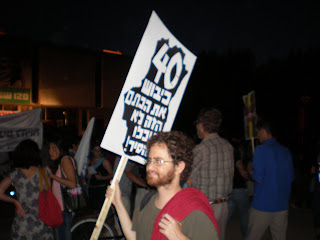dai la ki Bush
"40 years of occupation is a stain won't be able to erase, " reads the sign.
At at another productive rehearsal with Mid Life Crisis http://www.myspace.com/mlcisrael yesterday two of the guys mentioned that they were going to the peace rally protesting 40 years of occupation. I hadn't been planning on going, knowing that it would be a small, ineffective, ashkenazi affair that wouldn't even register with the media. The power lies with the politicians, not with the street and certainly not with the side-alley that is the active peace camp in Israel today. At best, it would be another social occasion where ageing lefties and keen youth movement members rub-shoulders nostalgicly for an hour. Still it had been a while since I'd gone to a demo and so we showed up at the end of the march from Rabin Square to the plaza in front of Tel Aviv Museum (where even a small demo looks bigger).
My fears were quickly realised. There were maybe 2,000 demonstrators coming from scores of little peace groups augmented by some Palestinian - Israelis waving red flags and some representatives from the homo-lesbian community. Before the speeches began the moderators, one Jewish and one Arab, tried to get the crowd chanting:
Occupation!
Crowd : No !
Negotiations!
Crowd : Yes!
Kibush (occupation)!
No !
Bush!
No!
This added a farcical element to an already sad occasion and we decided to skip the speeches and head back home to watch the second part of the excellent TV (Channel 10) documentary on the story behind the Six Day War - the war that entangled us in the kibush-bush in the first place.
As expected, the course of events that led up to the war were less clear cut than I had imagined. It appears that the trigger was actually mistaken intelligence that the Russians passed on to Nasser, namely that Israel was planning to attack Egypt. On the basis of this information, Nasser told the UN buffer force to leave, thereby raising tensions. He soon found out that the information was incorrect but by then he had become a prisoner of his own rhetoric and the huge expectations placed in him by the Arab world. His next step was to declare that the Straits of Tiran (that lead to Eilat) were closed to Israeli shipping. Israel's PM , Levi Eshkol, was against launching a war but the pressures on him from the army and the public were so great that he eventually relented, appointed Moshe Dayan as defence minister who launched the famous surprise attack. On the eastern front, the decisions to capture East Jerusalem and the the whole of the West Bank came about as the battle unfolded rather than as the result of a proper debate or government decision.

Meeting old peace-camp friends at the demo.




Comments